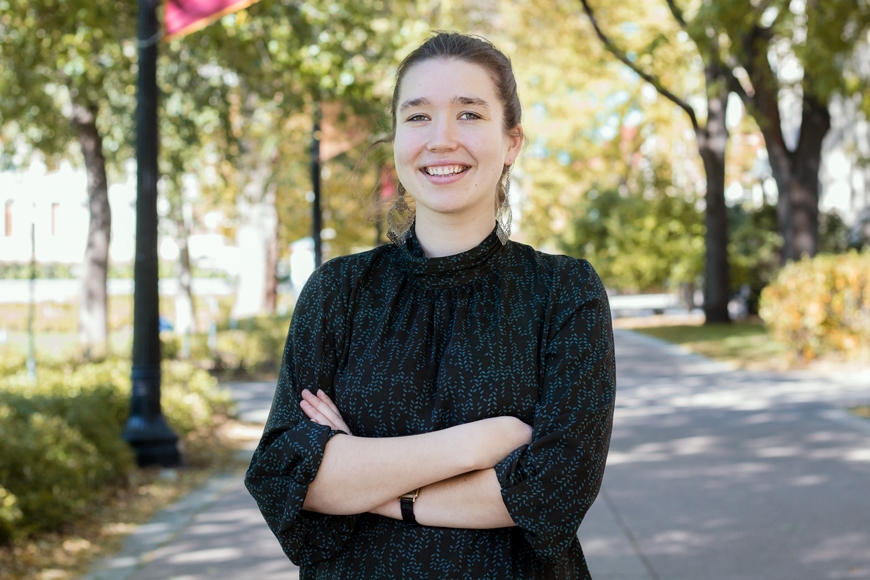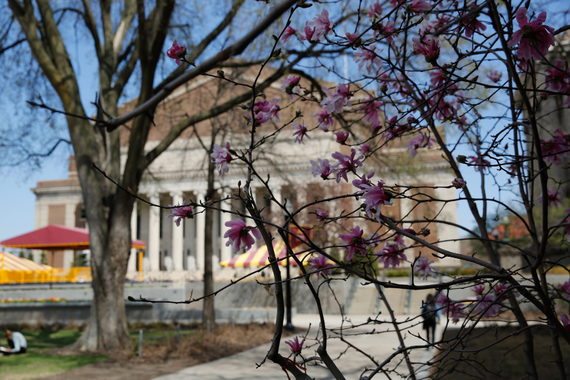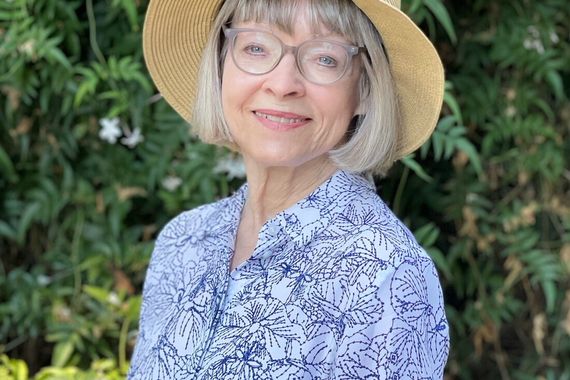A Mind to Invest In
“I really decided that if I was gonna go to the U, then I was gonna dig in and... make the most out of what was given to me. And fall in love with the city and fall in love with the campus. I made the conscious decision to do that, and I feel like that was really helpful.”
With majors in linguistics and German and minors in neuroscience and computer science, senior Annika Kohrt has certainly accomplished what she set out to do.
Double Trouble
While Kohrt’s four areas of study aren’t always associated with each other, she has found exactly how to combine her interests. Linguistics seemed like the obvious choice due to her love of literature. One of her favorite parts of linguistics is looking at the logical side of writing. “You get all these fun little backstories about words, you get insights into how people think, and how language is constructed in people’s heads,” says Kohrt.
Making the most out of her time at the U meant taking advantage of everything a liberal arts education has to offer, such as mastering a new language. Kohrt says “I did a German major because I wanted to be fluent in German, but then what I found really beneficial about the major was that it offers a cultural lens and a historical lens on language and on the pieces that connect to that.” Going above and beyond the CLA language requirement enriched her time at the University.
Her neuroscience and computer science minors allow Kohrt to take classes outside of CLA. Kohrt believes that “engaging in the different cultures of the different colleges on campus” is incredibly valuable. Her wide range of coursework gives her an interdisciplinary, intercultural edge, and her recent research in psycholinguistics proves how beneficial that is.
Real-World Research
When she’s not in the classroom, Kohrt spends her time in research labs. In 2017, at the Early Language and Experience Lab in the U’s College of Education and Human Development, she learned the ins and outs of “how a larger lab functioned,” including data entry, recruiting participants, and explaining the process to the research subjects. Having that background helped her thrive at the Institute of Linguistics’ Minnesota Syntax and Psycholinguistics (MSP) Lab in 2018.
Psycholinguistics studies “how your brain produces and comprehends language and the structures behind it and the rules that influence it.” Tools like electroencephalography (EEG) and magnetoencephalography (MEG) are commonly used to collect data on language-related brain activity, but at MSP Kohrt uses self-paced readings, in combination with EEG, to study UMN students. They display “dashes on the screen that represent the size of the sentence and where the words will show up. Then you use the spacebar to click word-by-word through the sentence, and then we can get data about where people spend a little longer looking at one of the words. Usually, that can tell us something about where they had difficulty processing a sentence.”
The research showed that the relationship between syntax, the structure of a sentence, and semantics, the meaning of a sentence, might be more complex than previously thought. “It seems that maybe you do the syntax first and make your predictions based on the syntactic structure of what you’re hearing, but if you hear a specific type of semantics, then you can kind of go back and understand the sentence in a different way,” she explains. Kohrt presented these findings at the 2018 CUNY Sentence Processing Conference at the University of California, Davis.
Kohrt’s research is more than just data; it ties directly back to her lifelong love for literature. What does it mean to be a good writer? What counts as a good sentence?
“If you really want people to pause and think about what you say… maybe you do that with rhetorical devices that make it harder to process.” In the future, Kohrt would like to answer these questions with her research. “I’d want to ask more of the rhetorical discourse questions that come up in my German major classes… and investigate them through the linguistic lens,” she says, like “what it means for the brain to look at poetry versus other types of language. That kind of thing is my secret wish for what I want to be looking at.”
Invest in Success
Kohrt was nominated for the Talle Family Scholarship by both the Institute of Linguistics and the Department of German, Nordic, Slavic & Dutch. It meant a lot, she says, “when they showed that they valued my contribution to the departments and that they thought I was worth supporting.”
This fall, Kohrt attended a luncheon with the donors and other scholarship recipients. “That was a really inspiring time for me because it was a reminder that having been given this [scholarship] was an expectation of doing well and using my full potential. And that people did think there was a potential to invest in… I feel very grateful to the Talle family and what they’ve done in that regard.” Created by Margaret and Kenneth Talle, who graduated from the University in 1966, the scholarship covers the cost of tuition up to $12,000 for each recipients’ final year at the University. It is awarded to just ten students each year.
About CLA, Kohrt remarks, “I think they appreciate their students. I think they really encourage them to get outside the classroom and try diverse things and support them in that way.” CLA is a space where students can comprehensively combine all of their interests for a personalized education that they thoroughly enjoy.
This story was written by an undergraduate student in CLA.



